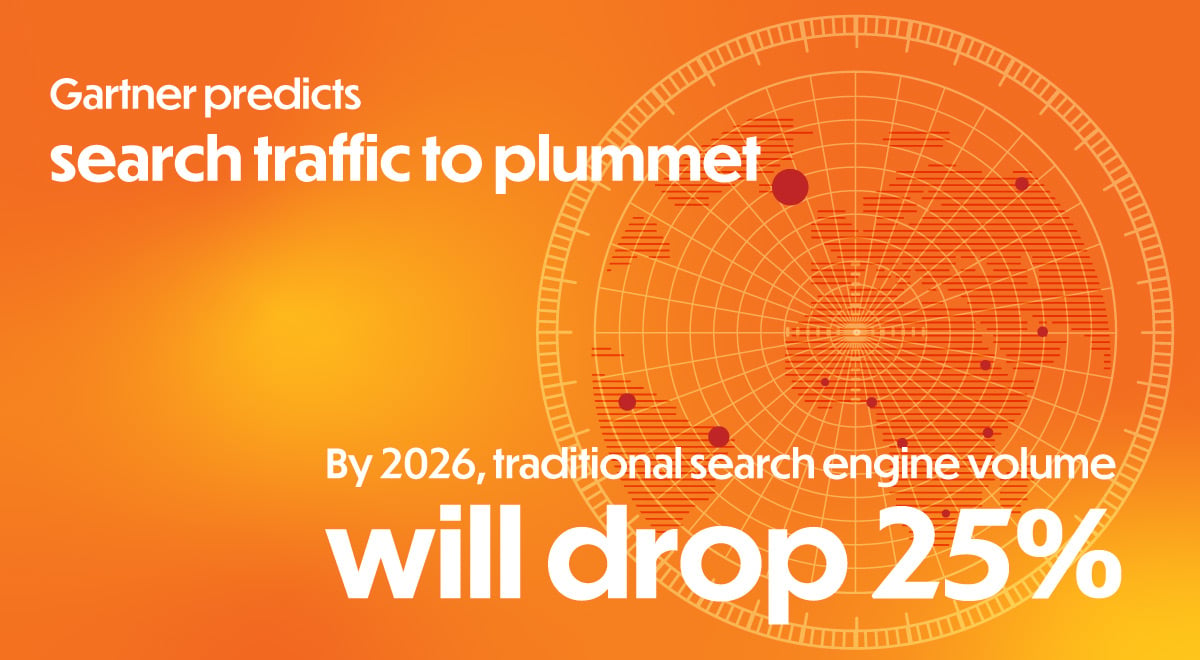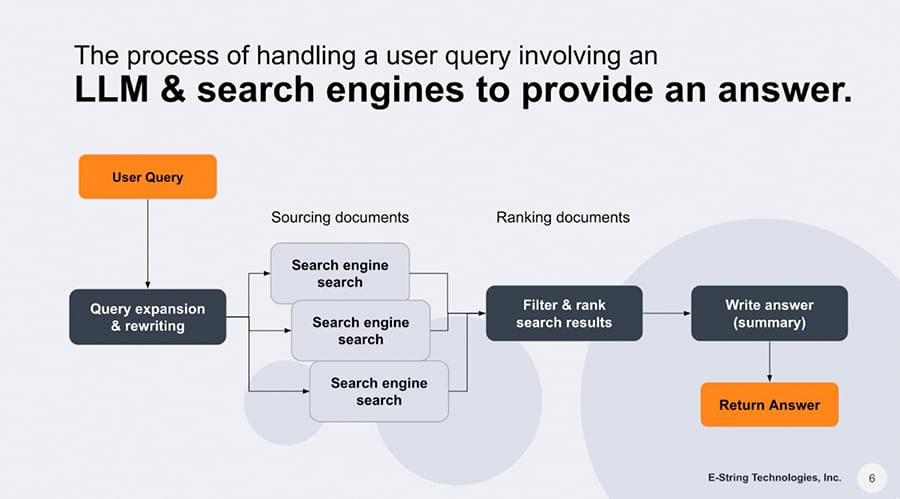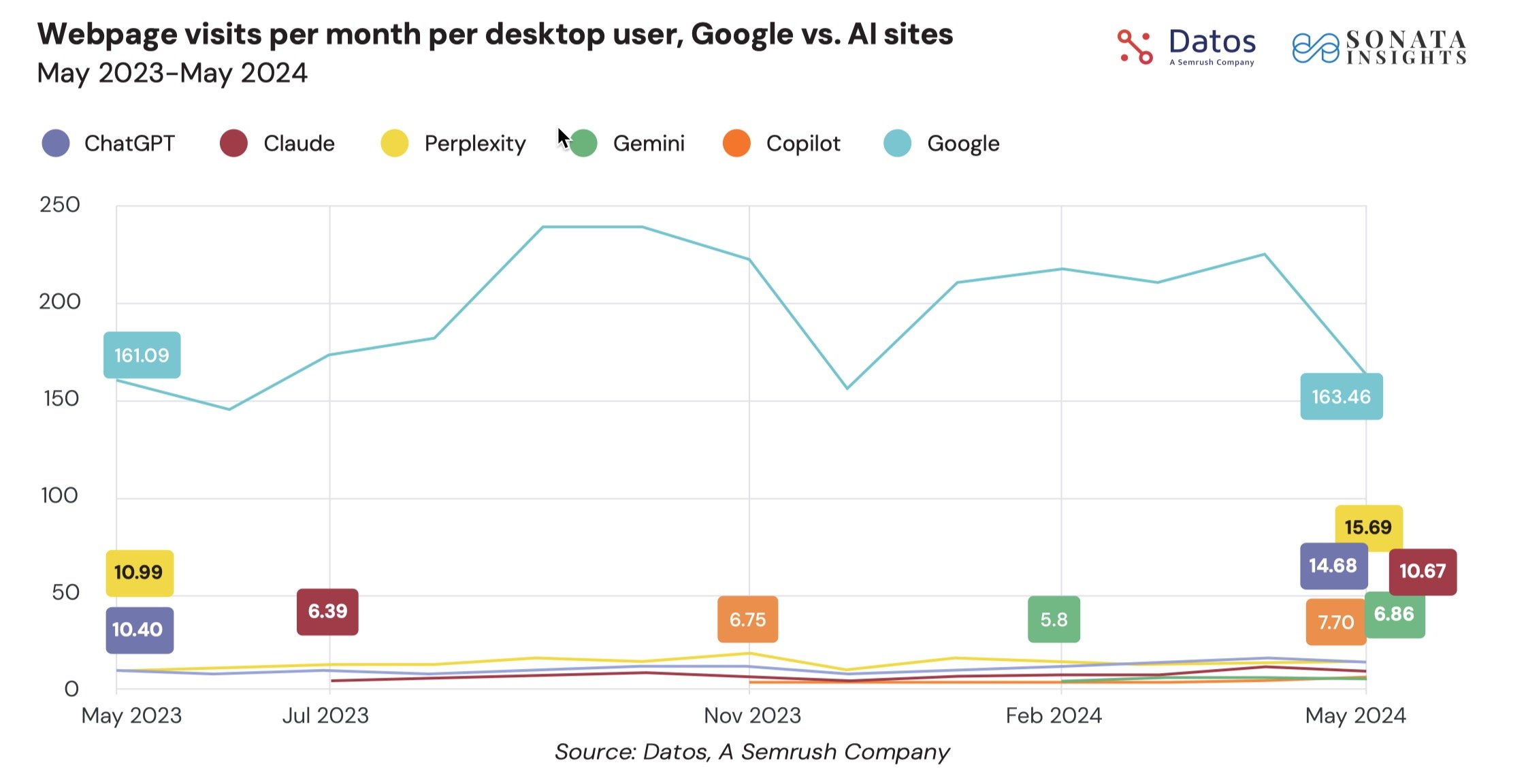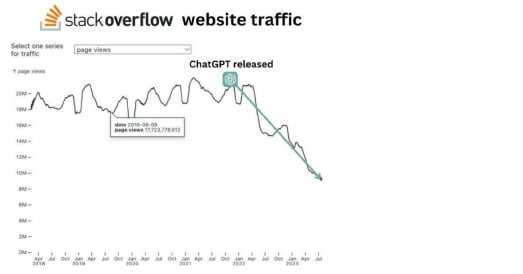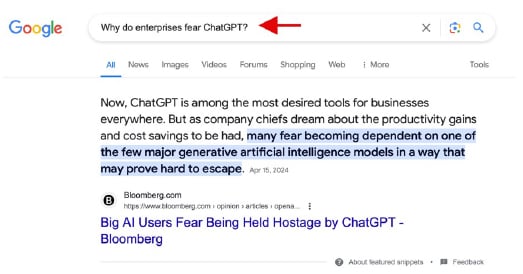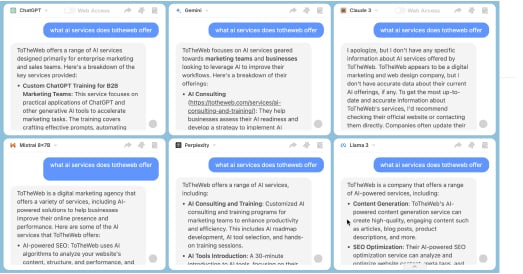AI Search Optimization Guide: Everything You Need to Know
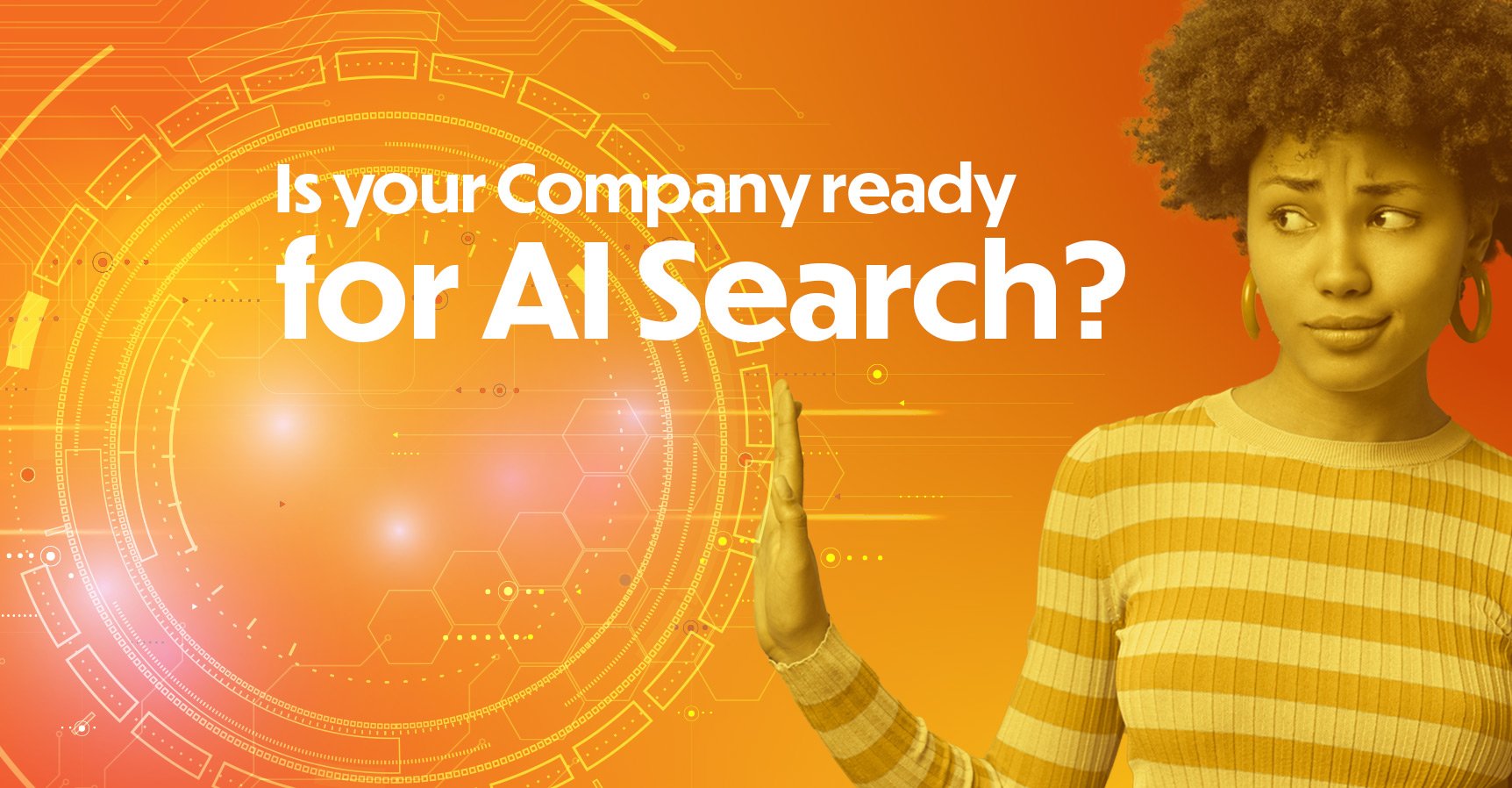
25% Traffic Loss Incoming: Your AI Survival Guide
AI is bulldozing the search landscape, rewriting the rules of online visibility. As people shift to AI chatbots for instant answers, websites face a new reality: the organic traffic they once took for granted is expected to drop by 25% by 2026 according to Gartner, and that’s just the beginning.
AI search rewards content that gets to the point. Lead with a clear summary, use headers that reflect real questions, and structure your page so it’s easy for both people and AI to understand. Add schema markup and cite trusted sources—these signals help AI choose your content as the answer.
Apple Confirms First-Ever Decline in Google Searches
For the first time in its 22-year history, Safari users are increasingly turning to AI tools like ChatGPT and Perplexity instead of Google. Source April 2025
Adapting to AI-Driven Search with Generative Engine Optimization (GEO)
Enter AI chatbots.
Chatbots cut through the noise, delivering instant, laser-focused responses.
No more wasted time sifting through multiple web pages. No more information overload.
It’s not surprising then that users are abandoning traditional search methods.
This shift in user behavior is bringing AI-powered search tools to the forefront, leaving traditional search engines as a second choice. Unfortunately, chatbot-based AI search tools typically don’t always return specific websites in response to a query, creating a dilemma for website owners.
The threat? A potential exodus of organic traffic, which has driven more than half of all traffic to websites. Website owners now face the stark reality of declining visitors.
AI Search Optimization: Your Guide to Leveraging AI-Driven Search Engines
Unlock the future of search with our comprehensive guide on AI Search Optimization, designed to enhance your content’s performance on AI-driven search engines like ChatGPT and Bing Copilot. Ideal for both seasoned SEO professionals and digital marketers, this guide equips you with cutting-edge techniques to excel in the evolving AI landscape.
Explore the dynamics shaping AI-driven search, learn strategic approaches to stay ahead, and implement actionable steps to future-proof your online presence. This guide serves as your roadmap to navigating and succeeding in the ever-changing realm of AI search.
Understanding AI-Search
Traditional SEO and AI search optimization differ in a few key ways:
| Traditional SEO | AI Search Optimization | |
|---|---|---|
| Focus | Targets keyword matching and backlinks | Emphasises user intent and context |
| Content Approach | Often keyword-heavy | Prioritizes natural language and comprehensive answers |
| Evaluation Criteria | Considers a range of factors, including content, quality, user experience, backlinks, and technical aspects | Uses machine learning to analyze content relevance and quality |
| User Experience | Aims for clicks and site visits - prioritizing clicks on ads | Focuses on providing direct answers and solving user queries |
| Evaluation Method | Uses ranking factors, including content quality, user experience, and technical aspects | Analyzes semantic meaning and contextual relevance |
| Updates | Google continuously tweaks its algorithm, often without public announcements | Evolves through periodic model training and deployments |
Where do AI systems get content from?
AI content is generated from extensive datasets including trillions of words from books, articles, and websites sourced from the internet—places like Wikipedia, GitHub, and news outlets. Additionally, OpenAI has partnered with publishers like Reddit to diversify and enhance these training materials, enabling the AI to produce more human-like text across various topics.
How do AI answer engines find content if they don’t crawl like Google?
While traditional search engines like Google crawl and index the web continuously, modern AI tools like ChatGPT (with browsing enabled) and Google Gemini operate differently. They are trained on large datasets but increasingly include real-time retrieval capabilities.
Instead of crawling the entire web in the background, these tools fetch relevant content on demand — typically from public, well-structured web pages. This isn’t crawling; it’s more like targeted retrieval. They don’t build a complete index like Google does.
LLMs prefer:
- HTML content with clear structure and headings
- Pages with concise summaries at the top
- Well-formatted content that’s easy to quote or summarize
Long pages are not a problem — as long as they’re scannable. A clear summary or answer box near the top increases the chance that your content is included in the AI’s response.
So while LLMs don’t crawl like Google, many now access and quote live web content — especially if it’s designed to be readable, reliable, and relevant.
The AI’s output is created from scratch; there is no template, it is not copied from anywhere, and the response is 100% unique (i.e. doesn’t appear on Google). It has not ‘memorized’ data; it is conceptualizing responses through statistical probability. It is not looking up a database, or plagiarizing existing content.
Dr Alan Thompson, Expert in Artificial Intelligence,
Former Mensa Chairman
As AI systems continue to evolve and expand their knowledge base, they’re not just changing how information is processed—they’re reshaping the entire search landscape. Let’s examine how this shift is impacting traditional search engines and user behavior.
Understanding LLM Behavior
Large Language Models (LLMs) are AI systems trained on vast text datasets to generate human-like language. These models, used by companies like OpenAI, Google, and Anthropic, analyze patterns in their training data to produce relevant text based on inputs. LLMs employ this complex, multi-step approach to generate responses.
Julio Barros
 Julio Barros, president of E-String discusses the multi-step process for when we use an LLM to search the internet. This is very similar to what people are calling RAG systems. It's basically the same process, except instead of searching over your own documents or the documents you put into the system, it's going to search over the internet.
Julio Barros, president of E-String discusses the multi-step process for when we use an LLM to search the internet. This is very similar to what people are calling RAG systems. It's basically the same process, except instead of searching over your own documents or the documents you put into the system, it's going to search over the internet.
Here's what happens:
- The user puts in a query. Sometimes it's just a keyword (we're very used to doing keyword searches in Google), sometimes it's a very specific question with secondary clauses and "ifs" and such.
- The system takes that query and, let's say it's always going to do an internet search. It might do some expansion on that query, it might rewrite the query to be better in some way that it thinks it needs to be better.
- Then it's going to do one or more internet searches. What it actually uses to search depends on the system. I'm going to be a little pedantic and say the LLM is kind of a model inside of another system, so it's not like GPT-4 that's doing this necessarily, it's ChatGPT or the search engine itself.
- It does one or more searches either with different queries or against different search engines. OpenAI and ChatGPT will use Bing. Google's system will use the Google search engine. Perplexity can use a variety of engines; we don't know exactly what it's doing, but it might have its own data sources or search engines.
- Those responses come back, and rather than showing you a page of links, the LLM will go through and look at these links and maybe filter them, remove things, or rerank them. Just because you're number one in a typical search doesn't necessarily mean you're going to be the most relevant page to answer this particular question.
- The system will rerank them and try to pick out the pages that are most likely to answer the question. Then it'll take that new ranking and basically summarize those pages to answer the question, to write the answer for that, and then provide references as it's been told to do to whatever the sources were.
- Finally, it'll return that answer to the user.
The Changing Search Landscape
People used to use search engines to find information, now they use chatbots and answer engines. They are abandoning keywords for conversations, forever changing how we discover information.
Shifting search trends: The AI impact on Google usage.
Our recent poll shows people are shifting from traditional search engines like Google to AI chatbots, now referred to as “answer engines,” for direct answers instead of traditional search queries.
We asked… How has the frequency of your Google searches changed since you began using AI tools?
| Decreased by >25% | 43% |
| Slightly decreased <25% | 30% |
| No change | 26% |
| Increased | 0% |
Organic search trends: Is Google use slipping?
Since August 2023, Google has been consistently losing U.S. search market share as AI chatbots such as ChatGPT increasingly replace traditional search engines due to their interactive and instant responses. In fact, OpenAI just launched its new AI-powered search engine prototype named SearchGPT, which is designed to provide fast and accurate answers with clear sources. It directly challenges Google’s dominance in organic search with advanced AI capabilities.
Market Share Insights from Statcounter
- Google: 90.91%, a small decline, down from 91.38% in March
- Bing: 3.64%, showing an increase.
- Yahoo: 1.13%, also increasing slightly.
A new study presented by SparkToro shows that in May 2024, Google’s desktop visits grew 10.4% year-over-year, while Perplexity, the leading AI search engine, saw 42% growth, reaching 15.69 million visits. Full report.
StackOverflow is taking a hit
Stack Overflow is a question and answer site for professional and enthusiast programmers that has experienced a dramatic drop in traffic as a result of chatbot usage.
Chatbots are taking over.
The rise of chatbots and AI-powered “answer engines” is fundamentally changing information search and consumption. This shift is eroding Google’s market dominance and transforming user behavior from keyword queries to conversational interactions. Businesses, especially in B2B, are already seeing significant benefits in efficiency and customer engagement.
As this trend accelerates, companies should consider how to leverage these AI-driven tools to enhance customer interactions and streamline operations, ensuring they remain competitive in the evolving digital landscape.
A Few Stats on Chatbots
- By 2024, chatbots are expected to save businesses up to 2.5 billion hours of work. They automate routine tasks like FAQs, feedback collection, and lead qualification.
- 58% of B2B companies actively use chatbots compared to 42% of B2C companies. Chatbots have proven especially valuable for lead generation in B2B.
- 65% of business-to-consumer communications are now handled by automated chatbots.
Perplexity AI and Google’s SGE: A Comparison
More challenges—even among answer engines, there are differences and subtleties in how they source and present information.
AI systems generally tend to favor established, authoritative sites as their content sources. However, the specific sites featured can differ significantly between AI platforms and traditional search engines. Let’s compare two prominent AI-powered search tools: Perplexity AI and Google’s Search Generative Experience (SGE).
| Perplexity AI | Google's Search Generative Experience (SGE) |
| An AI-powered search engine that provides direct answers to queries | An AI-enhanced version of Google Search |
| Aims to offer concise, focused responses often citing its sources | Generates comprehensive responses to user queries |
| Shows significant overlap (60%) with top 10 Google organic search results | Draws from a much broader range of sources beyond top-ranking sites |
| May favor websites with strong SEO tactics | Frequently features content from websites outside the top 10 organic search results |
| Provides a balance between authoritative sources and direct answers | Offers a more diverse content pool compared to traditional Google Search results |
Insights from recent studies
- For Perplexity AI, 60% of the content it displays overlaps with websites ranked in the top 10 Google organic search results for the same query. This suggests that strong SEO tactics pay off in gaining visibility.
- In contrast, studies on Google’s Search Generative Experience (SGE) show its content comes from a much broader range of sources compared to the top organic rankings:
- One study of 2,900 keywords found 62% of SGE’s featured content came from websites outside the top 10 organic search results.
- Another analysis of 1,000 keywords determined a staggering 93.8% of URLs shown in SGE were not present in the top organic rankings, compared to traditional results.
The takeaway is that Perplexity and SGE are very different from traditional search engines in their approach to sourcing content and different from each other. More data here.
Discover Key AI Platform Comparisons
Dive into the “AI Platform Capabilities Summary” tab to discover a detailed, comparative analysis of leading AI tools like OpenAI’s ChatGPT, Anthropic’s Claude, and more. Tailored for marketers, this outlines key functionalities, use cases, and limitations to help you choose the best AI solution for your projects.
Implications for SEO
- Shift in Ranking Importance: Ranking highly may no longer guarantee the same visibility in AI-powered search features.
- Quality Over Authority: Content quality and relevance may become more important than domain authority alone (has implications for big brands).
- Diversification of Sources: The content sources for AI search systems are more diverse than traditional search engines. While authoritative content is still favored, platforms like SGE are expanding the range of websites that can gain visibility in search results.
- Multi-Platform Optimization: With different AI models using varied selection criteria, content needs to be optimized for multiple platforms, not just Google.
The coming GenAI revolution in product and company search is the biggest change in 30 years in digital advertising and organic search traffic. Massive change is coming, and we predict an SEO bloodbath. Companies have gotten complacent in how they view investment and ROI in organic search optimization and the efficiency of their Google Ads spend, as 15-25% of organic search traffic leaves Google and moves to an LLM model in the next 24 months.
Paul Baier, CEO, GAI Insights
Perplexity and SGE differ significantly from traditional search engines in their approach to sourcing content. Unlike traditional engines, which primarily rely on a small group of top-ranking authoritative domains, SGE pulls from a diverse scope of websites. More stats here.
The Answer to the AI-driven Search Revolution: Generative Engine Optimization (GEO)
In response to this AI-dominated landscape, Generative Engine Optimization (GEO) has emerged as the new survival tool for websites in an era dominated by AI chatbots and shifting online visibility, replacing traditional Search Engine Optimization (SEO). This game-changing strategy is designed to boost your content’s visibility in the age of AI search.
What exactly is GEO?
GEO (Generative Engine Optimization) is the next evolution of SEO, tailored for the age of AI. It’s about optimizing your content not just for traditional search engines, but for AI-driven chatbots and large language models (LLMs) like ChatGPT, Google’s Search Generative Experience (SGE), Bing Chat, and Claude. This new approach aims to ensure your content is discoverable, understandable, and effectively utilized by AI systems when generating responses to user queries.
Here are the key features that distinguish GEO:
- AI-Centric Approach: Unlike traditional SEO, which targets search engine algorithms, GEO aims to make content more comprehensible and valuable to AI systems.
- Beyond Keywords: GEO goes beyond simple keyword matching, focusing on context, relevance, and the depth of information.
- Chatbot Optimization: It specifically targets AI-driven chatbots like ChatGPT, Google’s Search Generative Experience (SGE), Bing Chat, and Claude.
- Comprehensive Answers: GEO aims to provide content that AI can use to generate thorough, contextually relevant responses to user queries.
- Evolving Field: As AI technology advances, GEO strategies continue to develop, making it a dynamic area of digital marketing.
Why does GEO matter?
Imagine AI as a super-smart assistant that answers questions directly instead of just giving you a list of websites. These AI “answer engines” are becoming more popular every day, changing how people find information online.
GEO helps your content become one of the sources these AI assistants use to answer questions. As more people turn to these AI assistants for quick answers, traditional web searches are expected to become less common. GEO prepares your content for this shift, helping you stay visible and relevant in this new AI-powered world. Read this white paper from Cornell University.
How Does AI Search Optimization Work? The GEO Process.
The Prediction Process of LLMs
Generative Engine Optimization focuses on making targeted adjustments to website content to increase its likelihood of being shown by large language models (LLMs) such as ChatGPT, Google Gemini, and Claude when generating responses to user queries or prompts.
Understanding LLM Behavior
Here’s the catch….
While generative AI optimization can increase the chances of your content being used, it doesn’t guarantee that your company name will be mentioned or that a link to your website will be provided in the AI-generated responses.
Why? When an LLM answers a query, it’s predicting the most likely next word over and over, creating a unique response each time. This process doesn’t necessarily include naming sources or providing links, even if your content influenced the answer.
GEO vs Traditional SEO: Key Differences
Unlike traditional SEO, which primarily targets keyword usage and backlink profiles for higher search result rankings, GEO aims to make content more valuable to AI systems. This approach requires a deeper understanding of how AI systems interpret and value information, going beyond simple keyword matching.
From SEO to LLM Optimization
The relationship between search engine rankings and visibility in AI-generated responses is complex:
- Content quality connection: High-ranking websites often have quality content that LLMs also value, but this isn’t a direct causation.
- Learning from the web: LLMs trained on web data may indirectly consider website popularity and authority.
- Opportunities for newcomers and small sites: Smaller or newer websites could potentially compete by providing high-quality, AI-friendly content.
- Variations between AI systems: Different AI models will have distinct selection criteria and biases.
- Importance of the question (AKA: query): The importance of traditional rankings in LLM responses can vary based on the query type and content.
- The impact of evolving technology: As LLM technology advances, the relationship between search rankings and AI content selection continues to change.
- Contextual interpretation: LLMs analyze content holistically, finding relevance and connections beyond simple keyword matching used in traditional search rankings.
The Potential and Limitations of GEO
GEO strategies offer new ways to improve content visibility across AI-powered platforms. However, it’s important to approach this emerging field with realistic expectations. While GEO shows promise, we lack long-term data to confirm its effectiveness. The AI landscape is constantly evolving, which means today’s strategies may need adjusting tomorrow. This rapid change makes it challenging to predict GEO’s long-term impact.
Another catch…
LLMs are built to change slowly. They have huge training datasets and built-in safeguards that prevent quick changes to what they know. This means AI search optimization strategies might take a while to work.
But here’s the twist: many LLMs can now search the web in real-time. This lets them find up-to-date information, which could make GEO work faster than expected. It helps bridge the gap between the LLM’s core knowledge and what’s new online.
Despite these uncertainties, GEO remains a valuable area to explore. By understanding both its possibilities and limitations, we can develop more informed content strategies. As we continue to learn and adapt, the potential of GEO to enhance online visibility in an AI-driven world becomes increasingly clear.
AI Search Optimization Techniques For LLMs
A) Optimizing Content for Inclusion in LLMs
To increase the likelihood of your content being included in LLMs and improve its relevance in AI-powered applications, follow these actionable strategies:
1. Create In-Depth, Comprehensive Content
LLMs prioritize thorough, well-structured information. Implement these tactics:
- Cover All Angles: Explore your topic exhaustively, including related subtopics. Showcase your deep knowledge of the topic. This comprehensive approach helps LLMs understand the full context.
- Include insights, analysis, and information that clearly establish your authority in the field.
- Aim for substantial word counts (e.g., 1500+ words for key pages) when appropriate to showcase comprehensive knowledge.
- Use Examples and Case Studies: Incorporate real-world examples and up-to-date data. This enriches your content and helps LLMs make accurate connections between concepts.
- Define Key Terms: Explain technical terms and jargon clearly. This ensures both human readers and AI systems can fully comprehend your content. Use semantically-related terms and concepts.
- Organize Logically: Use descriptive headings and subheadings to structure your content. A well-organized article is more likely to be accurately processed and categorized by LLMs.
2. Focus on creating comprehensive FAQ pages
FAQ pages provide direct answers to common questions, serving as a valuable resource for both users and LLMs. They align well with natural language queries, including voice searches, and offer a centralized hub for detailed information. Use keyword research tool, “Answer the Public” and Google’s “People Also Ask” feature to identify popular questions in your niche. Answer these questions concisely, using 1-2 sentences per answer.
3. Adopt a Conversational Tone
LLMs are trained on natural language, so a conversational style can improve your content’s inclusion:
- Write in a natural, engaging tone that resonates with your audience.
- Use long-tail phrases that reflect how people actually speak and search.
- Instead of focusing on generic keywords (e.g., “enterprise software”), use phrases like “How to choose the right enterprise software for your company.”
4. Optimize for Featured Snippets
Featured Snippets can significantly boost visibility in search results, especially for queries that seek concise, authoritative answers, amplifying your search marketing impact. Example of a featured snippet.
5. Emphasize Clear and Active Language
LLMs favor precise, action-oriented language:
- Replace vague or wordy phrases with powerful verbs to enhance engagement. Use “buy” instead of “make a purchase,” for example.
- Read your content aloud to ensure it sounds natural.
- Use contractions and personal pronouns to maintain a conversational tone.
- Incorporate specific phrases and questions that match natural search queries, such as “What are the top features of enterprise software for small businesses?”
6. Enhance Content Structure and Presentation
While LLMs primarily process text, well-structured content is more likely to be accurately interpreted:
- Use bullet points and numbered lists for easy scanning and information extraction.
- Break up long paragraphs into shorter, more digestible chunks.
- Include descriptive captions for any images or videos to provide context for LLMs.
- Use consistent formatting and structure across your content to aid in pattern recognition.
7. Diverse Content Formats Description
Incorporate a mix of text, video, and images in your content. This diversity not only caters to different user preferences but also provides multiple ways for AI systems to understand and contextualize your information. Ensure each format complements the others, reinforcing your key messages across different mediums. Placement:
8. Optimizing for Voice and Conversational AI Interactions
Many techniques for optimizing content for AI platforms also enhance SEO performance. As AI-powered voice and chat interfaces become ubiquitous across various platforms, including voice assistants like Siri and Alexa, as well as conversational AI models like ChatGPT, optimize your content for natural language processing:
- Use conversational language that mirrors how people speak and ask questions.
- Structure content to directly answer common questions in your field.
- Implement structured data to help AI systems quickly identify key information.
- Consider long-tail phrases common in spoken queries.
- Optimize for featured snippets, often used in voice results and AI-generated responses.
- Ensure your content is mobile-friendly as many voice searches occur on mobile devices.
9. Enhancing Content Credibility, Authority, and AI Visibility
Establishing your Authority in AI Search results:
Research: Conduct and publish original research or data analysis to position yourself as a primary source.
Author Bios: Clearly state relevant qualifications in author bios to reinforce your expertise to both readers and AI systems.
Key strategies to implement:
- Credible Sources: Include expert quotes, case studies, and credible citations to improve visibility, add real-world context, and enhance trustworthiness.
- Fact-based information: Integrate relevant statistics and data to support the content, making it more informative and reliable.
- Readable and Clear Language: Optimize the fluency and simplicity of the text to enhance readability and understanding.
10. Craft Persuasive Content Description
Modify your content to be more persuasive by making authoritative claims backed by evidence. Use confident language, provide compelling arguments, and clearly articulate the value proposition of your ideas or products. This approach not only convinces human readers but also signals to AI systems the strength and relevance of your content.
11. Enhancing Cross-linking for AI Search
To improve AI search visibility, create a well-connected content structure. Organize topics into clusters with pillar pages, use descriptive anchor text for internal links, and include related article sections. This approach helps AI systems better understand your content’s context and relationships, potentially boosting its relevance in search results.
12. Monitor Performance Across Both Traditional and AI-Powered Search Results
There are excellent tools to monitor your traditional SEO efforts, such as Advanced Web Ranking. However, monitoring AI-generated search results requires a different approach.
Currently, one of the best ways to do this is by using ChatHub – a browser extension that allows users to interact with multiple AI chatbots simultaneously. With ChatHub, you can compare responses from various AI models like ChatGPT and Bing Chat side by side, helping you track how different AI systems handle queries related to your content. Here’s what it looks like:
B) Schema Markup and Technical SEO: Boosting AI Comprehension
1. Leveraging Structured Data for AI Optimization
Structured data plays a pivotal role in helping both search engines and AI systems understand and categorize your content effectively. Implement schema markup to provide clear, machine-readable context for your content. This approach is particularly crucial for:
- Complex products or services
- Events and time-sensitive information
- Organizational details
- Article and content type specifications
The Power of FAQ Schema
FAQ schema is a game-changer in the AI search landscape. Read: Google Case Study Shows Importance Of Structured Data
Here’s why it’s essential:
- Enhanced Discoverability: FAQ schema helps your content stand out in search results, increasing click-through rates.
- AI-Friendly Format: The question-answer format of FAQ schema aligns perfectly with how AI systems process and retrieve information.
- Voice Search Optimization: FAQ content is often used to answer voice search queries, a growing trend in AI-driven search.
- Featured Snippet Potential: Well-structured FAQ content has a higher chance of being featured in “People Also Ask” sections and featured snippets.
2. Title Tag Optimization: Balancing SEO and LLM Considerations
A recent Google Search ranking API leak confirmed title tags’ importance in SEO. While their direct impact on LLMs is unclear, these AI models often process web data including title tags.
Craft concise, keyword-rich title tags that accurately represent your content’s main topic. This may help LLMs understand your page’s core subject, even though LLMs primarily focus on main content rather than metadata. Preview how your meta title and description tags will appear.
3. Optimize for Wide Distribution – go beyond Google
LLMs often recognize content that appears across multiple reputable websites. Aim to have your content cited, quoted, or referenced on various platforms to increase its visibility to AI systems. For example, increase your PR spend to get to get your message more widely distributed.
Google’s Search Liaison, Danny Sullivan, recently said, “One of the ways to be successful with Google Search is to think beyond it.”
4. Cultivate Audience Engagement
Building a loyal readership and promoting content effectively enhances visibility across both traditional and AI-driven platforms. This engagement generates valuable signals that influence how AI systems assess your content’s quality and relevance. Source
To achieve this:
- Encourage and respond to comments on your content to foster community
- Create interactive content such as polls, quizzes, or surveys to boost engagement
- Leverage social media platforms to extend your content’s reach and encourage sharing
- Consider creating a loyalty program or exclusive content for regular readers
- Collaborate with influencers or industry experts to expand your audience reach
5. Encourage User Generated Content
UGC plays an important role in AI search optimization by providing authentic, diverse data that reflects real-world language and user intent. AI algorithms use UGC like reviews and social media posts to refine search results, potentially improving relevance and user trust. By leveraging UGC, brands can boost their SEO while building community and credibility – valuable factors in the era of generative AI. This trend highlights UGC’s growing importance in creating user-centric search experiences. Source
6. Optimize Video Content
YouTube is the second-largest search engine, and LLMs have incorporated vast amounts of video content. To improve the visibility of your content:
Help them return your content by enhancing video discoverability with descriptive titles, tags, and compelling thumbnails. Encourage likes, comments, and shares. Create video sitemaps for search engines. These strategies boost visibility in search results and AI-driven recommendations, supporting broader digital marketing efforts.
Use AI tools for content creation, optimization, and analysis to stay competitive in the evolving search and digital marketing landscape.
C) Balance AI Tools with Human Expertise
As LLMs evolve, they may better identify AI-generated content.
Avoid over-relying on AI-generated material; instead, use AI tools for research and ideation while ensuring the final content reflects human expertise. Incorporate unique insights and experiences that AI cannot replicate, preserving the irreplaceable value of human creativity.
AI-generated content overuse can lead to penalties, as shown by Mediavine banning a publisher for excessive AI use, highlighting the importance of maintaining a human touch in digital publishing.
Update 2024-08-04 | OpenAI’s Unreleased Tool Detects AI-Written Text with 99.9% accuracy.
When the marginal cost of creating new and customized content plummets, which it will as LLMs become even more capable, then content will explode, even more than it has today. The traditional web will be overwhelmed with AI generated content. The time to plan for this tsunami is now.
John Sviokla, Executive Fellow @ Harvard Business School | D.B.A., GAI Insights Co-Founder
By implementing these strategies, you can enhance your content’s compatibility with LLMs, improving its chances of inclusion and relevance in AI-powered applications and search results. This approach not only caters to AI systems but also creates more user-friendly content for human readers, potentially increasing engagement and reach.
AI Optimization: Boosting Findability and Transparency in Search
Optimizing for AI search can improve your content’s performance in both AI-powered platforms and traditional organic search results. This dual benefit arises because many strategies that appeal to AI systems align closely with established SEO best practices.
Well-optimized content has a higher chance of being referenced in AI-generated responses and ranking well in traditional search results. This screenshot shows ChatGPT using Bing to search 6 websites for the answer. Google is less frequently citing the same sources in AI Overviews that appear in Classic Search.
According to SEO firm Brightedge and reported by Search Engine Land, Google AI Overviews drop in June now only appearing for 7% of queries (down from 11%).
GEO Checklist for AI Search Success
This essential guide helps your content rank in generative engines like ChatGPT, Gemini, and Perplexity.
Download the Checklist
Q&A from our Expert Panel
We’ve explained how AI is changing the search landscape, discussed strategies to take advantage of these changes and presented actionable steps that companies can take to future-proof their online presence. However, as we discussed, the new AI-driven landscape is nuanced and continuing to evolve. For that reason we decided to reach out to some experts in the field.
Fortunately, In July I hosted a panel on the AI Learning Lab where I interviewed two AI experts Alden Do Rosario, CEO of CustomGPT and Julio Barros, President of E-String on some specific issues. Here is what they had to say.
#1 – Can LLMs be influenced to reflect personal views or content for other people?
It’s a common belief that LLMs can be manipulated to consistently favor a specific viewpoint. We asked our panelists weigh in: timestamp :2:54 min
- Yes, through data sources like Bing search and Common Crawl
- Limited control, depends on fixed knowledge and search tools
- Individual users can’t significantly influence LLMs
- Group behavior might influence LLMs over time
Alden Do Rosario
 The feeling is that, yes, it is similar to SEO. Large Language Models (LLMs) can indeed be influenced if you start appearing in their data sources. For example, if you look at ChatGPT, many of its data sources come through Bing search or Common Crawl. So, if you are able to get yourself indexed in Common Crawl or rank highly in Bing search results, you can potentially start showing up in ChatGPT responses.
The feeling is that, yes, it is similar to SEO. Large Language Models (LLMs) can indeed be influenced if you start appearing in their data sources. For example, if you look at ChatGPT, many of its data sources come through Bing search or Common Crawl. So, if you are able to get yourself indexed in Common Crawl or rank highly in Bing search results, you can potentially start showing up in ChatGPT responses.
We've been ignoring Bing. Historically, everyone has been optimizing for Google. How do we optimize for Google? We do backlinking, monitor our results, and make sure we're ranking number one for all the queries that matter. We've just been focusing on Google, Google, Google.
Now it's time to take a step back and say, "Okay, great, I'm ranking number one in Google, but am I ranking number one in Bing?" Because if you don't apply the same optimization strategies to Bing that you're using for Google, and if you're not making sure you're ranking number one in Bing, then you won't show up in ChatGPT results.
ChatGPT uses Bing as its search tool. So when you ask a question like "What is the weather today in San Francisco?", the LLM by itself doesn't have that knowledge. Under the hood, it will kick off a search to Bing.
--- Optimizing for Bing Search
Optimizing content for Bing search, while sharing some commonalities with traditional SEO practices used for other search engines like Google, involves some specific strategies due to differences in how Bing processes and ranks web content. Here are some key aspects that distinguish Bing SEO from traditional SEO practices:
- Keyword Usage and Page Titles:
- Bing: Bing places a strong emphasis on the presence of exact keywords in titles, meta tags, and content. It is generally considered more literal in its interpretation of queries.
- Traditional SEO: While keywords remain important, there’s a stronger focus on relevance and context rather than just the exact match keywords.
- Backlinks:
- Bing: Quality backlinks are important, but Bing also places significant value on the number of backlinks, viewing them as a key indicator of a page’s authority.
- Traditional SEO: The focus is more on the quality and relevance of backlinks rather than sheer quantity. Google, for example, emphasizes link quality much more heavily.
- Social Signals:
- Bing: Social signals, such as shares and likes on social media, are explicitly mentioned by Bing as a ranking factor. This means that content popular on social networks can perform better in Bing’s search results.
- Traditional SEO: While social signals can indirectly affect rankings by driving traffic and engagement, they are not direct ranking factors in Google's algorithm.
- Technical SEO:
- Bing: Bing has a strong preference for older, more established domains and clearly favors certain technical elements like a clear sitemap, which helps its crawler, Bingbot, index pages efficiently.
- Traditional SEO: While technical SEO is crucial across all search engines, Google, for instance, places more emphasis on mobile-first indexing and site speed.
- Multimedia Content:
- Bing: Bing seems to index and understand multimedia content such as images and videos better than Google. Thus, having rich multimedia content can boost rankings more noticeably.
- Traditional SEO: Although multimedia enhances user engagement, it’s primarily the textual content that’s been traditionally emphasized for optimization.
- Local SEO:
- Bing: Bing Places plays a significant role in local search results, and the integration with Microsoft’s mapping services means that having a well-optimized local presence is essential for visibility.
- Traditional SEO: Google My Business dominates local SEO strategy, with features like reviews, posts, and local citations playing a major role
Julio Barros
 There's very little control you can exert over the fixed knowledge base of language models. You might have slightly more influence over what happens when they use tools to search the internet, but even that would be very difficult to manipulate.
There's very little control you can exert over the fixed knowledge base of language models. You might have slightly more influence over what happens when they use tools to search the internet, but even that would be very difficult to manipulate.
As LLMs evolve towards more agent-like technology, they may learn more about individual users' interests, preferences,and personal facts. They'll likely use this information to generate personalized answers. However, this personalization would only affect responses for that specific user, not for others.
These systems will have memory. They'll also have different kinds of system prompts that you can specify. For example, you can indicate that you prefer very academic answers or very simplistic answers, and that will affect what you see in your results. I don't believe this will affect what other people see.
To influence results for everyone, you'd need to impact either the training data or the search results themselves. I'm not sure how much one can influence the training data. As for influencing search results, that's more in line with traditional SEO and search engine optimization techniques.
#2 – Can repeated user interactions with an LLM shape its responses over time, potentially biasing it towards specific perspectives or information sources?
- Individual user interactions do not currently shape LLM responses over time
- LLMs don’t monitor user behavior like page visits or time spent on results
- While an individual can’t bias the model, group behavior at scale may influence LLMs over the long term
- Companies like OpenAI likely use aggregate user data to improve their models
- The potential for collective user influence raises ethical questions about LLM training and output
Julio Barros
 It's important to think about what this question really means. Perhaps it's drawing a parallel to how Google works: if you quickly bounce from a page, Google may not rank that page highly anymore. Conversely, if you spend time viewing and examining a page, Google interprets this as a sign of quality and may give it a higher ranking.
It's important to think about what this question really means. Perhaps it's drawing a parallel to how Google works: if you quickly bounce from a page, Google may not rank that page highly anymore. Conversely, if you spend time viewing and examining a page, Google interprets this as a sign of quality and may give it a higher ranking.
The question seems to be asking if something similar happens with LLMs. However, I don't think this is really feasible, at least not with any LLMs we currently know of.
These systems just give you an answer; they don't necessarily monitor whether you visit a suggested page or how long you spend there.
Just because you like an answer or keep asking the same question doesn't mean that anyone else will see that result. The system might learn what you want, but not necessarily what anybody else wants.
Alden Do Rosario
 I agree that the answer is no for an individual, but as a group, I would be shocked if over the long term the LLM cannot be influenced.
I agree that the answer is no for an individual, but as a group, I would be shocked if over the long term the LLM cannot be influenced.
OpenAI will use every piece of data in its power to make its engine better, so if thousands of people are exhibiting certain behavior, I would expect OpenAI to learn from that.
Remember, a couple of months ago, ChatGPT itself was learning like crazy from all the behavior. The whole reason to make ChatGPT public was so that they could gather learnings from consumer behavior. So I would be really surprised if they aren't already doing it, or if they don't take group behavior into account.
However, I am pretty confident that you, as an individual, cannot sit there and do a thousand sessions with ChatGPT and say, for example, "Alden is the best cricket player in the world." If I sit there and do that all day long, it won't change the model's overall responses.
#3 – What influences an LLM’s decision to cite sources, and how does this reflect its understanding and information retrieval? <30 min>
- LLMs typically cite sources when they’ve used external tools like Bing search or partnerships with news/Reddit
- Without external tools, LLMs rely on their training data and don’t cite specific sources
- The decision to cite is often influenced by the system prompt given to the LLM
- ChatGPT is transparent about when it’s using external search, showing this to users
- Source citation reflects the LLM’s certainty about where specific information came from
Alden Do Rosario
 Why does an LLM return citations sometimes and not others when it's the same query?
Why does an LLM return citations sometimes and not others when it's the same query?
The answer likely lies in whether it used the search tool (Bing) or not. If it did not use the tool, the news corporation partnership, or the Reddit partnership, it will not cite a source. If it did use one of these, the model has a guarantee that a specific source was used and can cite it. Otherwise, it's just running its probabilistic math.
But if it used the tool - where the tool is the backend search done through Bing - then it can confidently say, "Okay, here's where I got the data from." That's the big difference.
I think ChatGPT is quite transparent about this. It will show you when it's triggering a search, and you can use the drop-down menu to see which URLs are being returned and things like that.
Julio Barros
 What influences the decision to cite sources?
What influences the decision to cite sources?
I think, taken literally, it would be the system prompt that's given to it to do the search. The prompt might say something like, "You will use this information to answer this question and make sure you cite the sources." So whatever information it uses, it will then be compelled to cite those sources.
Your next steps
Here’s your action plan to thrive in the age of AI search:
- Revamp Your Content Strategy: Create comprehensive, well-structured content that addresses user queries in-depth. Remember, AI loves context and thoroughness.
- Optimize for Conversational Queries: Adapt your content to match the way people naturally ask questions, catering to both voice search and chatbot interactions.
- Leverage Structured Data: Implement schema markup, especially FAQ schema, to help AI systems better understand and categorize your content. Don’t forget to try our free FAQ schema generator tool to simplify this process!
- Monitor and Adapt: Regularly check how your content performs in AI-driven search results. Use tools like ChatHub to compare responses across different AI models and adjust your strategy accordingly.
- Balance AI and Human Touch: While optimizing for AI, never lose sight of your human audience. Blend data-driven insights with creativity and genuine value.
- Stay Informed: The world of AI search is evolving rapidly. Subscribe to our newsletter/blog for the latest updates and strategies in AI search optimization.
AI is changing how Customers find you online
August 5/2024
Rosemary Brisco
AI Training Videos
AI Consulting and Training
Master today’s most effective productivity tools.
ToTheWeb ensures your route to capitalizing on the immense power of AI is fast and efficient. Our AI consulting and training programs will quickly enable your marketing team to adopt solutions to optimize operations and boost performance.
Learn about our generative AI and ChatGPT consulting and training programs

